“Should I use WordPress or Google Sites?” This is a question we get asked all the time. We’ve worked with both platforms extensively – from building simple blogs to creating complex business websites – so we understand why it’s such a common dilemma.
As experienced web developers, we have helped hundreds of people choose the right platform for their needs. While WordPress and Google Sites both offer easy ways to create a website, they each have unique pros and cons, so it’s important to choose the right one for you.
In this article, we’re sharing everything you need to know about WordPress vs Google Sites, so you can make the right choice without spending weeks researching. We’ll discuss real examples, break down the costs, and help you understand which platform is best suited to your goals.
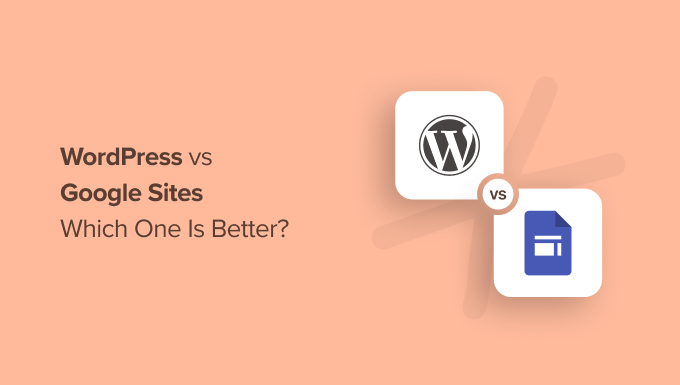
Since we want to create the most detailed WordPress vs. Google Sites comparison, we have broken down the article into multiple in-depth sections. In each section, we will show which platform offers the most benefits to a beginner:
- Overview of WordPress and Google Sites
- WordPress vs. Google Sites: Hosted vs. Self-Hosted
- WordPress vs. Google Sites: Features & Plugins
- WordPress vs. Google Sites: Design & Layout
- WordPress vs. Google Sites: SEO
- WordPress vs. Google Sites: Support
- WordPress vs. Google Sites: Monetization
- WordPress vs. Google Sites: Cost
- WordPress vs. Google Sites: Which Is Better?
- Frequently Asked Questions About WordPress vs. Google Sites
Overview of WordPress and Google Sites
To start with, let’s take a look at what WordPress and Google Sites each bring to the table when it comes to building a website. We’ll also outline the key advantages and disadvantages of using each platform. This will give you a good initial understanding before we dive into the details.
What Does WordPress Offer?
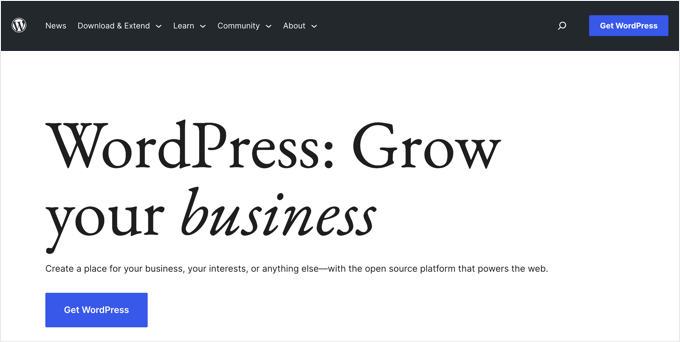
WordPress has been around for over two decades and has seen continuous improvements, making it the powerhouse it is today. In fact, WordPress now powers over 43% of sites on the internet.
That makes it the most popular website builder and content management system (CMS) in the world. Many of the most successful blogs and websites use WordPress, including a lot of big-name brands.
You can use WordPress to build pretty much anything you can imagine online, from simple personal blogs to complex business websites, bustling eCommerce stores, membership sites, and much more.
And the best part? You can easily extend the functionality of your WordPress website using plugins (think of them as apps) and completely change its appearance by installing themes.
To create a WordPress website, you will need to purchase a domain name and web hosting. Luckily, the best WordPress hosting companies make it easy to set up your website with a 1-click WordPress installation.
Here’s a quick look at some of the key advantages and disadvantages of using WordPress. We’ll be exploring these in more detail as we compare it side-by-side with Google Sites throughout this article:
Pros:
- The WordPress software is free, open-source, and super easy to use.
- You can host WordPress on your own website, giving you full ownership and control over all your content.
- The WordPress block editor is beginner-friendly and allows you to add rich content by inserting blocks into your posts.
- You can add more features to your WordPress website using plugins.
- You can customize the look and feel of your WordPress website by installing a theme.
- There are many ways to make money using a WordPress blog, such as running ads, making affiliate income, and selling products and services.
- You can get valuable insights into your website traffic using powerful tools like Google Analytics.
- Powerful SEO plugins can boost your website’s visibility in search engines like Google, and drive more people to your website.
Cons:
- WordPress requires more setup than Google Sites, including purchasing web hosting. However, this can be quite inexpensive.
- You will need to install the WordPress software, but many hosting providers do this for you automatically.
- You will also need to update and backup the WordPress software. However, this is straightforward, and there are plenty of easy-to-use backup plugins to choose from.
Note: In this article, we are talking about WordPress.org and not the WordPress.com hosting service. If you’re unsure, then please see our guide on the difference between WordPress.org and WordPress.com.
What Does Google Sites Offer?
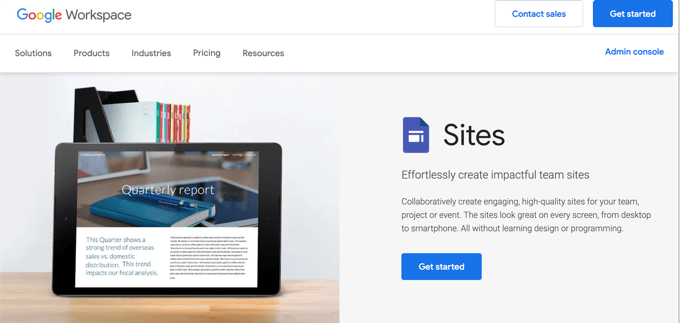
Google Sites is a free platform for creating websites that was launched in 2008 after Google acquired the JotSpot website-building technology. It was completely rebuilt in 2016 with a simpler and more streamlined website design.
While Google’s Blogger product helps you create a blog, Google Sites allows you to build other types of websites, such as a team, event, project, or question and answer site.
Built with ease of use in mind, Google Sites seamlessly integrates with other familiar Google services like Google Docs, Google Sheets, and Google Slides, making it straightforward to manage your content if you’re already using these tools.
This makes it a convenient platform for Google users to create a basic website and is especially suitable for internal sites for teams that are using Google Workspace. These sites can be viewed by just your team or the general public, depending on your sharing settings.
However, it’s worth noting that Google Sites hasn’t seen widespread adoption and currently powers a very small fraction of all websites online – only around 0.1%.
Here’s a quick rundown of some of the key advantages and disadvantages of using Google Sites. We’ll be comparing these directly with WordPress as we go through this article.
Pros:
- You don’t need to install or update software to use Google Sites. It is available to anyone with a Google ID or Google Workspace.
- The Google Sites editor is easy to use. However, it only offers basic features.
- Google Sites integrates easily with other Google products, such as Google Docs, Google Sheets, and Google Drive.
- You can use Google Analytics to track your website visitors.
- Google Sites is free to use, although you will need to pay for Google Workspace and a domain name.
Cons:
- Google Sites has limited features, and you can’t add more using plugins.
- Google Sites offers fewer themes and customization options than WordPress.
- Google Sites does not offer built-in monetization tools, so you may struggle to make money online.
Now that you have a general idea of the pros and cons of WordPress and Google Sites, we can jump into our full review.
WordPress vs. Google Sites: Hosted vs. Self-Hosted
One of the biggest benefits of using WordPress is that you can install it on your own web hosting account. This gives you complete ownership of all your website content and full control over how you build and promote your brand online.
That means you will need to organize web hosting where you can install the WordPress software. Luckily, installing WordPress is normally very easy, and the best hosting companies offer 1-click WordPress install.
On the other hand, Google Sites is a hosted service. The software is automatically available to all Google users, and your website content is stored on Google’s servers. You need to follow their terms of service, and they can change the software and pricing plans at any time.
Plus, Google has been known to unexpectedly discontinue its products in the past, leaving the future of your website in doubt. This lack of direct control is a key difference compared to the self-hosted nature of WordPress.
Winner: WordPress
WordPress vs. Google Sites: Features & Plugins
WordPress is designed to be flexible, meaning you can create just about any type of website. You can easily add the features you need to create a blog, small business site, online store, portfolio, or something else entirely.
That’s because you can add new features to WordPress using plugins. These are apps you can install to add new features to your website, such as image galleries, contact forms, backups, and much more.
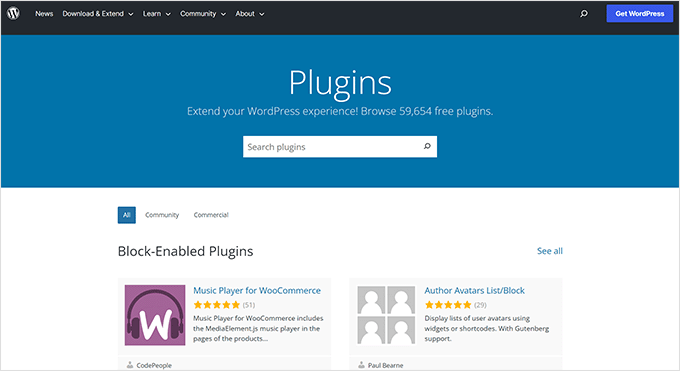
You have an incredible selection to choose from – around 60,000 free plugins in the official WordPress plugin directory alone! There’s also countless premium plugins available from third-party websites.
Google Sites takes a different approach. It is designed to make it easy to create basic websites without coding or design skills. It lets you easily add content from other Google services. However, there’s no way to add new features or extend its functionality beyond what’s built-in.
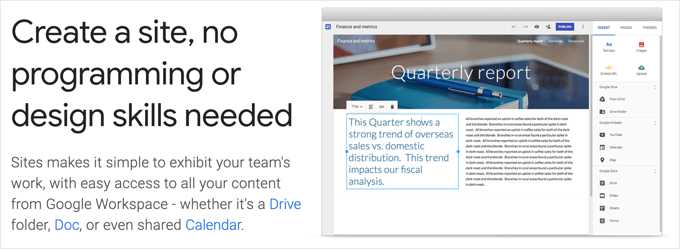
While Google Sites makes it easy to create a simple website, you might find that you quickly outgrow its limited features. This is a big difference compared to the power and flexibility of WordPress plugins.
Winner: WordPress
WordPress vs. Google Sites: Design & Layout
WordPress themes allow you to easily customize the look and feel of your WordPress website. They control how your site looks to visitors and give you lots of options to personalize it and even add unique features.
You can customize your theme using the built-in theme customizer or full site editor, or a page builder plugin that offers a beginner-friendly drag-and-drop interface.
When it comes to page builders, SeedProd is our top pick as it lets you create attractive landing pages and even completely custom themes without writing a single line of code.
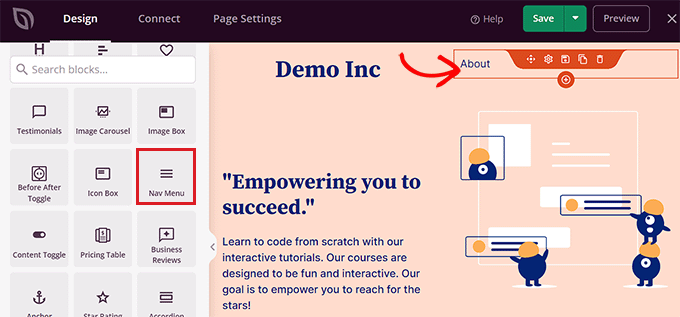
SeedProd offers a range of professionally designed themes and page templates that you can start using with just a few clicks. They also provide ready-made site template kits tailored to different niches, complete with example content that you can easily adapt to your own needs.
We used SeedProd to design many of our partner websites, and have always found it to be a reliable, user-friendly, and incredibly powerful tool.
Want to hear more about our firsthand experiences with it? Then be sure to check out our in-depth SeedProd review for all the details.
Google Sites also provides templates to help you get started quickly. However, the selection is very limited, with only 4 basic templates available.
You can also customize the appearance of your website using themes. While it only offers 6 themes, there are color and font options for each theme.
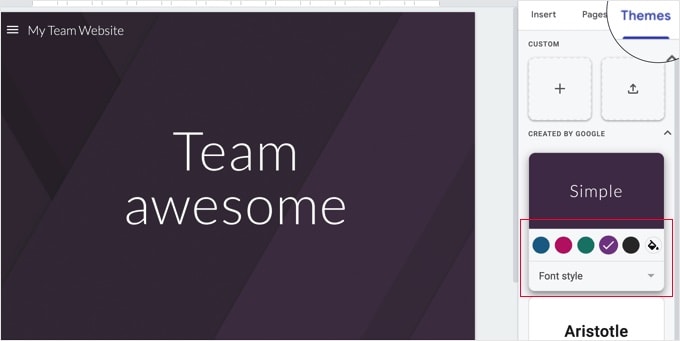
You can also create your own theme and import third-party themes. However, the customization you can achieve in Google Sites does not come close to that of WordPress.
Winner: WordPress
WordPress vs. Google Sites: SEO
Most websites get a lot of traffic from search engine results pages (SERPs). SEO stands for ‘search engine optimization’ and is all about making your website content appear higher in search results so that people can find it easily when they’re searching online.
When building your website, we recommend choosing a platform that’s designed with search engines in mind.
WordPress is built with SEO best practices baked right in, such as permalink settings that create SEO-friendly URLs, categories that organize your content, and much more.
You can also improve your SEO using WordPress SEO plugins and tools. For example, All in One SEO lets you add SEO titles and meta descriptions and choose a focus keyword. It also offers recommendations on how to optimize your blog posts.
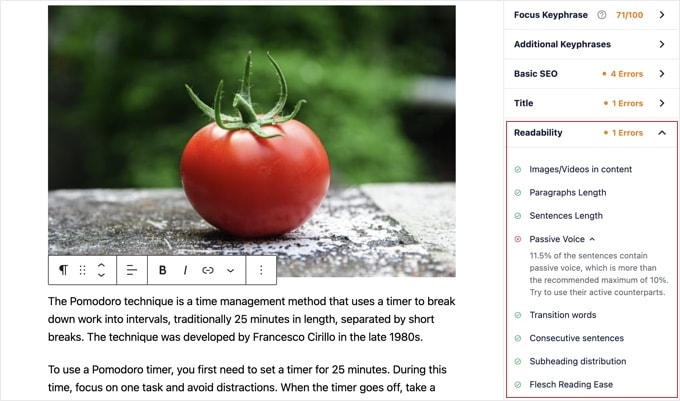
Google Sites, on the other hand, doesn’t offer these built-in SEO advantages or the ability to extend its SEO capabilities with plugins. However, if you are just using Google Sites to create internal resources for your team within a Google Workspace environment, then SEO won’t be important.
But if you are creating public websites and you care about SEO, then Google Sites is not the best platform to use. Even Google acknowledges that ‘if SEO is your primary consideration, it might be worthwhile to explore other options.’
In any case, you might find our handy checklist on how to optimize blog posts for SEO helpful, regardless of whether you end up using Google Sites or WordPress.
Winner: WordPress
WordPress vs. Google Sites: Support
When it comes to getting help and support, WordPress has a fantastic and extensive community. Often, you can find the answer to any WordPress-related question with a quick Google search.
You’ll find official documentation and active support forums over at WordPress.org. And because WordPress is so widely used around the world, there’s a wealth of incredibly useful third-party resources available online – like right here at WPBeginner.
If you need technical support for a WordPress plugin, then you can visit the dedicated support forum on WordPress.org or the plugin’s own website. You can learn more in our guide on how to properly ask for WordPress support and get it.
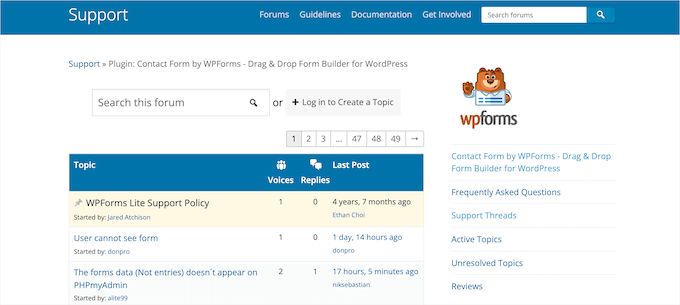
And as you know, you will find a large range of free resources at WPBeginner. You can also ask for help on social media platforms, such as our WPBeginner Engage Facebook group, and view video tutorials on our YouTube Channel.
Google Sites also offers a lot of support options to its users.
You can find information on a variety of topics in the Google Sites Help Center and ask specific questions in the Google Sites Community Forum. If you are looking for training materials, then you should visit the Google Sites Training Center.
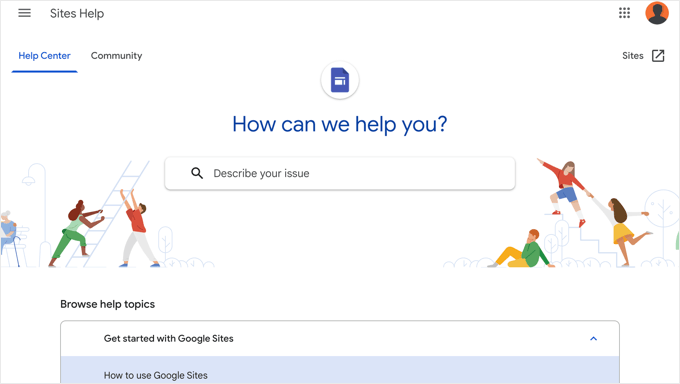
Besides these resources, Google offers several paid customer support options for Google Sites. Users can pay for Google Sites Support Premium, which can help you with a variety of tasks, including troubleshooting, configuration, and customization.
You can also pay for Google Sites Developer Support.
Winner: Tie
WordPress vs. Google Sites: Monetization
WordPress gives you complete control over your website, including the ability to monetize it any way you like without restrictions.
Here are just a few ways you can make money online with your WordPress website:
It is more difficult to make money from a website on Google Sites. That’s because it doesn’t include built-in monetization features like advertising integrations, and it is not a suitable platform for creating an online store.
That’s not to say you can’t make any money on Google Sites, just that there are fewer options that will require more effort.
For example, you can manually embed the code needed for Google AdSense or affiliate marketing into your site’s HTML. You could also offer exclusive content to subscribers and include payment buttons using third-party tools like PayPal or Google Forms.
Before deciding on a way to monetize your Google Site, always check Google’s policies and guidelines to make sure you’re not breaking any rules.
Winner: WordPress
WordPress vs. Google Sites: Cost
When you’re making a decision about which website platform to use, the cost is always a key factor to consider. So, let’s break down the expenses involved in creating a website with WordPress versus Google Sites.
The Cost of a WordPress Website
The WordPress software itself won’t cost you a cent – it’s completely free to use. However, to get your website online, you will need to invest in a domain name (your website’s address, like wpbeginner.com) and web hosting (the space where your website files are stored). You might be wondering about the typical costs involved.
Typically, you will pay $14.99 per year for a domain name and $7.99 per month for a hosting plan. This can add up if you are just starting out.
Luckily, it doesn’t have to cost that much. You can save money when you choose Bluehost, a web hosting company recommended by WordPress. They have agreed to give our readers a huge discount on hosting and include the domain name for free.

Besides that, they also include a free SSL certificate that protects your users’ privacy and allows you to accept online payments.
With that in mind, you can get started for as low as $1.99 per month.
And that’s all you’ll need to pay if you’re happy to get started with free WordPress plugins and themes. As your website grows and your needs evolve, you can always choose to invest in premium themes or more advanced plugins as required. This scalable approach helps keep your initial costs down, while giving you options further down the line.
For a more detailed breakdown, be sure to check out our guide on the cost of building a WordPress site.
The Cost of Google Sites
Google Sites is a free service. Anyone with a Google ID can use it, and it is part of Google Workspace (formerly G Suite), which provides a range of productivity and collaboration tools for businesses.
Google Workspace itself costs between $6 and $18 per user per month when paid annually. You also need to pay for a domain name, which is typically $14.99 per year.
For most users, these will be the main expenses involved with Google Sites. However, some might choose to pay for third-party tools they want to integrate with their site or hire a developer for assistance with the initial setup.
To compare typical costs for the first year, WordPress may cost you around $33, and Google Sites around $87. Keep in mind that Google Workspace includes more than just Google Sites, but you’ll have to pay for each individual user who needs access to it.
Winner: WordPress
WordPress vs. Google Sites: Which Is Better?
Now that we’ve compared WordPress vs. Google Sites, it’s clear that WordPress is a much better option for starting a new website, in most cases.
WordPress offers more design options and a much wider variety of themes. Plus, extending your website’s functionality with plugins is incredibly easy. And all this power and flexibility comes at a very affordable monthly cost.
If you’re keen to get started with WordPress and build your own website, be sure to check out our complete, step-by-step guide on how to create a WordPress website. It’s perfect for beginners! Alternatively, our team of WordPress experts can create a website for you.
Is there any time that Google Sites would be a better option? Yes.
If your organization already heavily relies on Google Workspace and you need to quickly create a basic internal website for sharing information and resources within your team, then Google Sites can be a straightforward and convenient solution. However, for most public-facing websites and businesses looking to grow online, WordPress offers the features, flexibility, and control you’ll need for long-term success.
Frequently Asked Questions About WordPress vs. Google Sites
Do you still have questions about WordPress vs. Google Sites? Here are answers to some of the questions we are asked most often by our readers.
Can I save money using Google Sites instead of WordPress?
In general no, most businesses will find WordPress more affordable than Google Sites. You just need an affordable hosting plan that includes a free domain, such as one offered by Bluehost or Hostinger.
However, if your business is already using Google Workspace with a custom domain, then there is no additional charge for using Google Sites.
Can I use my own domain name with Google Sites?
Yes, it is possible to connect up to 5 custom domains with a single Google Sites website. You can add these in Google Sites settings, and you will be prompted to follow some steps to verify that you own the domain or domains you wish to use.
Which is easier to use, WordPress or Google Sites?
Both WordPress and Google Sites are quite easy to use. Google Sites is designed to be beginner-friendly, so it has a simpler interface but also more limited functionality.
WordPress offers more features and customization. While it is easy to use, beginners may find it more complex. However, it is the platform that will continue to meet your needs as they grow in the future.
Can I easily migrate my content from Google Sites to WordPress?
No, there is no automatic way to move your content over from Google Sites to WordPress. You will need to carefully copy and paste the contents of each web page individually.
That means that if you think you may want to change to WordPress in the future, it is best to start with a WordPress website.
We hope this tutorial helped you compare WordPress vs. Google Sites. You may also want to see our guide on important reasons why you should use WordPress for your website or our expert picks for the best WordPress hosting.
If you liked this article, then please subscribe to our YouTube Channel for WordPress video tutorials. You can also find us on Twitter and Facebook.





Jiří Vaněk
We tried both Google sites and Wordpress and ended up staying with Wordpress. It is more complicated to manage and requires regular maintenance. But if a person takes care of the website, Wordpress is better in terms of potential growth. It is of course also a slightly more expensive option like paid plugins and so on. but the freedom and scalability are worth it. Thank you for the nice comparison of these systems.
Mrteesurez
Thank you for giving us this comparison article. it’s indepth.
But, I have few things to point out:
1. In term of easiness and simplicity, I will give it to Google sites because no installation or hefty management but lack custom features and functionalities.
2. For the cost, Google sites should be cheaper as there is no fee for hosting , theme or plugins but lacks monetization flexibility and core business features.
We all know WordPress is the all round best compared to others as WordPress can be use to create nearly any type of websites while nearly impossible for other site builders.
Thanks.
WPBeginner Support
Thank you for sharing your opinion
Admin
Jiří Vaněk
I have a feeling that the biggest thing that deterred us from Google sites was the impossibility of connecting a domain without www, as we only had a Cname record for the www subdomain. And it was very difficult to point the domain of the second line without the IP address of the server. That’s why Wordpress and self-hosting won in the end.